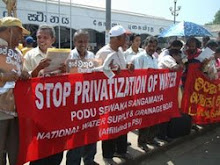The people in Paraguay consider water to be a fundamental right, and to pay outlandishly high prices (since the water prices in Asuncion are the highest in South America) puts a burden on families in the lower and middle class in terms of affording education, food, shelter and the basic needs for their families.
Now, the World Bank and the IMF put the citizens of Paraguay between a rock and a hard place. They maintained that they would decrease or cut the funding that they provide the country's government. The World Bank was not looking out for the welfare of the country and its citizens, but for the large corporations that would own the telecommunications and water utility, to charge citizens and make a profit.
The government in Paraguay has been under shaky reforms and controlled by series of dictators, and pseudo-dictators. Although they have claimed themselves independent, and hold "democratic" elections, the corruption is quite significant in all levels of civil service and government. The people of Paraguay are quite right to feel wary about the decisions the government makes for its people. Especially when greater forces like the World Bank have a say in the activity of the larger companies in the country, the voice of the people is in danger. Paraguay may be one of the most poorly represented populations in South America, or indeed the world.
Corruption in the Government-- and Reform.
The government will often go over the head of the people, giving them plenty of reason to be suspicious of the huge companies that want to "modernize" the country at a terrible cost to the people.
With the corporate giants in league with the political machine in Paraguay. Most of the "public" utility enterprises are run by the government with a corporate backing to finance them. However, despite the presence of large companies, most of the poorly run centers depress the overall economy.
Conflict theory emphasizes the role of coercion and power, a person's or group's ability to exercise influence and control over others, in producing social order. The government and large privatization companies are no stranger to this coercion-and will continue to regulate the privatization of utilities to maximize their own profits. The rigidity of the social caste system intensifies because people are forced to pay for utilities to the point where they are denied other opportunities to move up the social ladder. Citizens find themselves in a fixed social position, unable to seek fortune or better their lives. They're paying for WATER! They're paying to wash, to drink, to clean and cook... the government definitely has more control when regulating a substance in which people need to survive.
Classical economics viewed the company as a single decision-unit engaged in maximizing profits. It ignored the possibility of conflict between owners, managers and employees. The obsession with competition failed to take into account the other goals which may take precedence in organizations. Organization theory partly owes its existence to a reaction against such simplistic ideas.
How does this apply to Paraguay? Well, the companies that are putting a price on the fundamental right to water are indeed maximizing profits. The decisions are made with the priority of profit first, and people second. The competition between companies will be eliminated in the monopoly that will be enacted, and the entire framework of public utilities will be divided into small purveyors of water in towns and cities. For the most part, this change has already occurred, much to the unease of the Paraguayan population and the organizational machine is already whirring into a frenzy of profits, ownership and denial and human rights.
Bad Faith will out...
-L

No comments:
Post a Comment